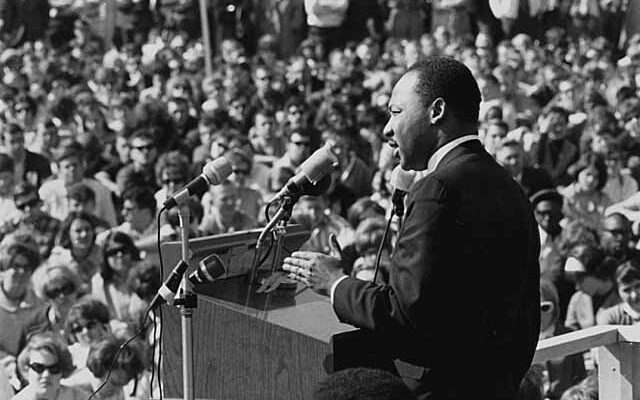For decades since his 1968 passing the legacy of Martin Luther King Jr. has inspired musicians from all over the world.
With MLK tributes in every music genre — from soul and R&B to hip-hop and jazz to rock and folk — the songs have underscored the immense impact the beloved civil rights leader had, and continues to have, on the world.
In honor of Martin Luther King Jr. Day, we thought it only appropriate to look back at some of the most memorable musical tributes paid to the icon leader.
‘Why? (The King of Love Is Dead)’ Nina Simone, 1968
Simone debuted this moving track during a concert at the Westbury Music Fair in New York on April 7, 1968, just three days after King was shot and killed. The singer’s voice is full of emotion, conveying both great sorrow and respect, as she sings the lines that had been quickly written by bass player Gene Taylor in a burst of inspiration.
That first performance of “Why? (The King of Love Is Dead)” — along with seven other numbers from that night — can be found on Simone’s stellar “‘Nuff Said!” album from 1968.
‘Happy Birthday,’ Stevie Wonder (1980)
Stevie Wonder was a major part of the campaign to get King Jr.’s birthday recognized as a national holiday. And this single, “Happy Birthday,” was arguably his greatest contribution to the cause, as it prompted millions of voices to join together in harmony.
The song was released as the fourth single from 1980’s “Hotter than July” album, but failed to make much of a dent on the U.S. charts — reaching only as high as No. 70 on the R&B charts. It did much better in other countries, including the U.K. (No. 2) and Israel (No. 1).
‘Pride (In the Name of Love),’ U2 (1984)
It’s a mesmerizing song, even if U2 did famously commit an historical error in the lyric “Early morning, April four, a shot rings out in the Memphis sky.” (The shooting actually occurred after 6 p.m., something that Bono acknowledges in concert by changing the lyric to “Early Evening, April 4.”)
“Pride” has been one of U2’s top anthems ever since it was released as the lead single to 1984’s landmark “The Unforgettable Fire.” That album — U2’s fourth overall — also closed with another memorable King tribute, “MLK.”
‘King Holiday,’ various artists (1986)
All-star benefit singles were big in the mid-’80s, highlighted by the blockbuster success of two songs aiding famine relief efforts in Africa — “We are the World” and “Do They Know It’s Christmas?” One of the best of bunch — although not widely remembered — was “King Holiday,” released in January 1986 to honor the first observance of the Martin Luther King Jr. national holiday.
The groovy sing-along brought together some of the brightest stars in R&B, pop and hip-hop, including Whitney Houston, Run-D.M.C., Teena Marie, New Edition, James “J.T.” Taylor (of Kool and the Gang fame), Menudo (with Ricky Martin), the Fat Boys, Grandmaster Melle Mel, Whodini and Kurtis Blow. Still, the benefit single — which raised funds for the King Center for Nonviolent Social Change in Atlanta — only managed to reach as high as No. 30 on the R&B charts.
‘Shed a Little Light,’ James Taylor (1991)
James Taylor carries MLK’s message of hope and harmony so well on this softly reassuring number, which was one of the standout tracks off his platinum-selling 13th studio album, “New Moon Shine.”
“Oh, let us turn our thoughts today to Martin Luther King,” James Taylor sings at both the start and finish of “Shed a Little Light.” “And recognize that there are ties between us, all men and women living on the Earth — ties of hope and love, sister and brotherhood.”
‘By the Time I Get to Arizona,’ Public Enemy (1991)
The mighty Chuck D is at top of his game as he condemns the state of Arizona for revoking its Martin Luther King Jr. holiday in this cutting track from the 1991 Public Enemy album “Apocalypse 91… The Enemy Strikes Black.”
Some will also remember the striking, yet controversial music video, which some activists — reportedly including MLK’s widow, Coretta Scott King — condemned for its violent imagery showing Black paramilitary members assassinating Arizona politicians in a variety of ways. Still, there’s no denying that this track is classic P.E., with Chuck D using pure fury to propel himself to great heights.
One year after the song was released, Arizona voters decided to reinstate the holiday.
‘Wake Up,’ Rage Against the Machine (1992)
We’ll take any opportunity to follow up P.E. with Rage Against the Machine, so make it a double dose of fury and drop the needle on this razor-sharp cut from Rage’s self-titled debut of 1992. Bassist Tim Commerford, drummer Brad Wilk and all-world guitarist Tom Morello are at their punishing best, backing vocalist Zack de la Rocha as he outlines theories of how the government plotted against King and other Black leaders.
The song, which was prominently placed in the 1999 blockbuster “The Matrix,” closes with the lyrics “How long, not long — because what you reap is what you sow.” With that closer, de la Rocha is not only drawing from the Bible — Galatians 6:7, to be exact — but also, in turn, from King’s speech at end of the Selma to Montgomery March in 1965.
‘Like a King,’ Ben Harper (1994)
Ben Harper juxtaposes two different Kings — Martin Luther Jr. and Rodney — in this offering from his 1994 debut album, “Welcome to the Cruel World.” The song, which was inspired by Rodney King’s beating at the hands of the Los Angeles Police Department in 1991, has been around now for more than a quarter century. Yet, sadly, it still feels so topical in 2021 as Harper bemoans racial injustice and police brutality against Blacks.
“Well, Martin’s dream has become Rodney’s worst nightmare,” Harper sings. “Can’t walk the streets — to them we are fair game; our lives don’t mean a thing.”
‘Glory,’ Common, John Legend and Rhymefest (2014)
Among the many selling points of director Ava DuVernay’s 2014 film “Selma” — revisiting the 1965 Selma to Montgomery marches that King took part in — was the stunning theme song performed by Common and John Legend.
The song, which was co-written by the two performers and Chicago hip-hop artist Rhymefest, went on to win both a Golden Globe and an Oscar for best original song as well as a Grammy for best song written for visual media. The video is every bit as memorable as the song itself, with dramatic scenes from the movie spliced together with strong performances from Common and Legend.
Keep up with the latest trending music news by following us on Facebook, Twitter, and Instagram
Author: Saul Goode
Photo: Minnesota Historical Society


